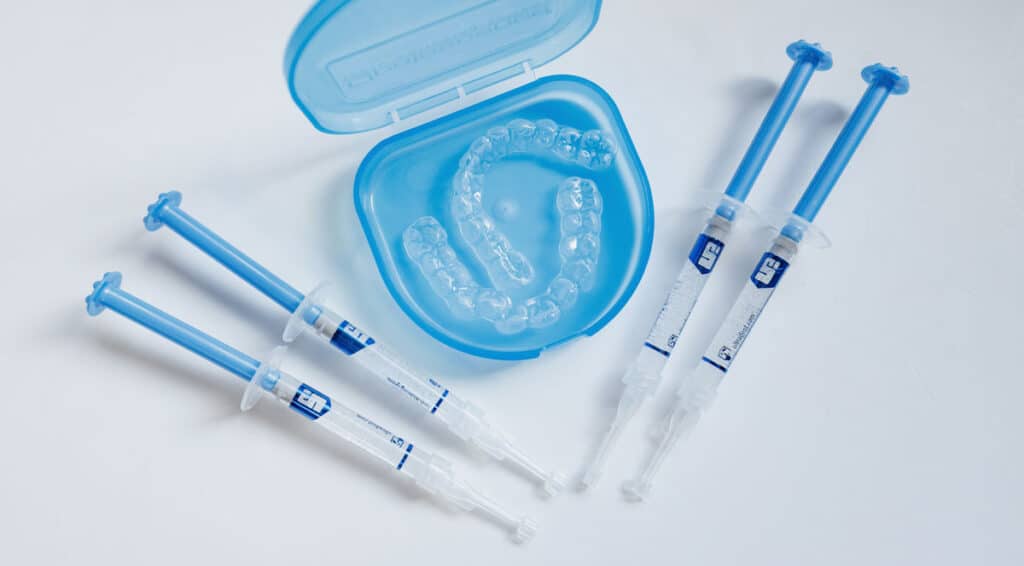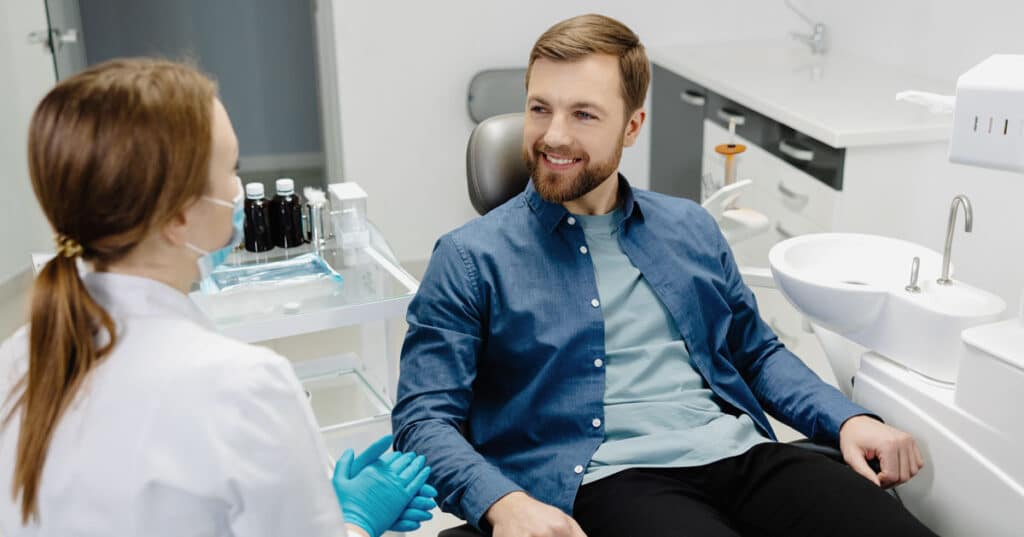A bright, confident smile is something many people in the UK value. Whether it is for a special occasion, to boost confidence at work, or simply to feel good about yourself, teeth whitening has become one of the most requested cosmetic dental treatments.
Unfortunately, the popularity of whitening treatments has also led to a rise in illegal tooth whitening kits and unqualified providers offering unsafe procedures. These can put your oral health at serious risk.
In this article, we will explain why professional whitening at a registered dental practice is the only safe and effective option for achieving a whiter smile. We will explore what legal whitening involves, the dangers of unregulated kits, how to spot illegal services, and what to do if you have already used one.
What does tooth whitening involve?
Understanding how whitening works
Professional tooth whitening is a controlled dental procedure that takes place within a registered dental surgery under the supervision of qualified dental professionals. The treatment uses approved whitening gels that safely release hydrogen peroxide, the active ingredient responsible for breaking down the molecules that stain teeth.
When applied in a thin, even layer, the gel penetrates the enamel and targets discolouration within the tooth structure, producing a lighter and brighter appearance without harming the enamel surface.
The bleaching efficacy of professional whitening depends on the type and depth of staining. Extrinsic stains, such as a coffee or wine stain, can usually be lifted more easily than deeper intrinsic staining caused by trauma, medication, or fluorosis. During treatment, your dentist carefully monitors exposure times and gel concentration to ensure an even result and to prevent gum irritation or tooth sensitivity.
Tailoring treatment for different concerns
Not every tooth responds in the same way to whitening treatment.
In some cases, a single tooth may appear darker than the rest due to previous dental work or internal discolouration. For example, a dead tooth that has undergone root canal treatment may require internal bleaching rather than surface whitening.
Your dentist can provide tailored solutions to address these issues and achieve a consistent shade across all visible teeth.
Professional whitening treatment focuses on achieving a natural appearance rather than a complete colour change. The goal is to create a significant decrease in staining while maintaining a healthy, balanced smile that complements your overall tooth colour.

The growing popularity of teeth whitening
The rise of cosmetic dentistry in the UK
Cosmetic dentistry has become increasingly popular across the UK. Treatments that enhance appearance, such as tooth whitening, veneers, and orthodontics, are now considered part of normal dental care. Whitening teeth is often one of the first steps people take to refresh their smile because it is quick, non-invasive, and can produce immediate results.
Teeth whitening products use safe levels of active ingredients, such as carbamide peroxide or hydrogen peroxide, to lighten tooth colour by breaking down tougher stains. In professional settings, whitening treatments are carried out under the supervision of qualified dental professionals, ensuring the concentration of bleaching agents is carefully controlled.
Social media influence and the quest for a brighter smile
Social media has played a major role in promoting the desire for whiter teeth. Influencers often share before-and-after photos, leading many to believe that whitening can be done easily at home using over-the-counter kits.
Unfortunately, many of these teeth whitening products are unregulated and can contain high levels of bleaching compounds that may damage the enamel surface, irritate the gums, or even cause permanent harm to tooth structure.
What is legal teeth whitening in the UK?
The role of the General Dental Council (GDC)
In the UK, tooth whitening can legally be performed only by a dental professional who is registered with the General Dental Council (GDC). This includes dentists, dental hygienists, dental therapists, and dental technicians working under direct prescription from a dentist. The GDC regulates all dental professionals, ensuring they meet the standards necessary to protect patient safety.
Any individual or company offering whitening teeth services without being GDC-registered is breaking the law. This includes beauty salons, spas, and online sellers advertising home-based bleaching products that claim to provide professional results.
What qualifies as professional whitening treatment
A professional whitening treatment involves a full dental examination to assess the health of your teeth and gums. Your dentist will identify the cause of tooth discolouration and determine whether whitening is suitable. Conditions such as enamel erosion, gum disease, or decay must be treated first.
Professional whitening typically uses either hydrogen peroxide or carbamide peroxide bleaching gel in controlled concentrations. These gels chemically react with the acquired dental pellicle on the tooth surface, breaking down stains while protecting the underlying enamel. Dental practices use custom-made trays that apply a thin layer of gel evenly over the teeth, ensuring effective whitening and minimal risk of gum irritation.

The dangers of illegal whitening kits
Harmful chemical concentrations and unregulated ingredients
Many illegal tooth whitening kits sold online or on social media contain very high levels of peroxide gel or other whitening agents. In the UK, professional dental practices can use up to 6% hydrogen peroxide, and home kits provided through a dentist can contain up to 0.1%. Unregulated products often go far beyond these limits.
Excessive use of aggressive bleaching agents can lead to enamel damage, tooth sensitivity, and gum irritation. Chemical degradation of the tooth surface can cause long-term harm, leading to root resorption or permanent weakening of the enamel structure.
Risks of permanent tooth and gum damage
Illegal whitening products can cause severe side effects. The high concentrations of bleaching compounds can strip away the enamel, increasing tooth sensitivity and leaving the teeth more susceptible to decay.
Improperly fitted trays or whitening strips can also allow peroxide to leak onto the gums, resulting in gingival irritation or chemical burns. In extreme cases, misuse of unregulated whitening gels can cause root canal treatment to become necessary due to nerve damage.
Who can legally perform teeth whitening?
Qualified dentists and registered dental professionals
As previously stated, tooth whitening in the UK can only be carried out by a dental professional who is registered with the General Dental Council (GDC). This includes dentists, dental hygienists, dental therapists, and dental technicians who work under the direction of a dentist.
Dentists and hygienists understand how bleaching agents work on both the enamel surface and the dentine beneath. They assess each patient individually, considering factors such as existing restorations, amalgam restoration, or ceramic crowns that may not whiten in the same way as natural teeth.
How to check if your provider is GDC-registered
Before booking a whitening treatment, always check your provider’s credentials. The General Dental Council maintains an online register where you can verify that your chosen dental professional is fully licensed to perform whitening treatments.
Avoid anyone offering tooth whitening in beauty salons, pop-up clinics, or online without GDC registration. These operators are acting illegally and may use unsafe materials or methods that can cause lasting harm to your teeth.

How illegal whitening kits bypass regulations
Online marketplaces and social media sellers
Unregulated whitening kits are frequently sold on popular online marketplaces and social media platforms. These products often claim to contain professional-grade bleaching gel or peroxide gel for rapid results. In reality, many include unknown or banned substances, or dangerously high levels of active ingredient.
Such products may promise “shades lighter” teeth overnight, but they often cause enamel erosion, surface roughness, and even tooth staining due to chemical imbalance.
Misleading advertising and fake “clinic” setups
Some illegal providers operate fake “clinics” or offer mobile whitening services without proper dental qualifications. They may advertise themselves as “trained technicians” or “whitening specialists,” but only a GDC-registered dental professional is legally permitted to provide in-office bleaching or home whitening kits.
These operations frequently use misleading images and testimonials to attract customers. They may also use cheap whitening gels that can cause gum irritation or tooth sensitivity due to unregulated peroxide concentrations.
Common warning signs of an unauthorised provider
No GDC registration number displayed
A legitimate dental practice will always display its GDC registration details and provide clear information about who will perform the treatment. If a provider does not offer these details or avoids discussing them, it is a strong indication that the service is illegal.
Unrealistic prices and promises of “instant results”
Be careful of anyone promising “instant whitening” or results that last forever. Professional whitening takes time and is carefully monitored to keep it safe and effective. Illegal providers often advertise very low prices, but these short-term savings can result in expensive dental repairs later because of enamel damage or tooth sensitivity.

In the news: BBC investigation
What the investigation found
A recent UK-wide investigation by the British Broadcasting Corporation revealed a growing illegal teeth whitening market. Unregulated operators were found offering high-strength bleaching treatments in car parks, homes, and beauty salons, using whitening kits that exceeded legal peroxide limits.
Laboratory testing identified gels containing hydrogen peroxide concentrations of up to 53 per cent, far above the legal limits of 0.1 per cent for home kits and 6 per cent for professional use in the UK.
The report also highlighted that many of the individuals providing these illegal treatments had received minimal or no professional training. Some had completed short online courses or unaccredited workshops that failed to cover essential dental knowledge, such as assessing oral health, recognising contraindications, or managing bleaching and tooth sensitivity.
Proper whitening treatment requires clinical training, an understanding of tooth structure and enamel protection, and registration with the General Dental Council to ensure patient safety.
The risks and response
The investigation uncovered cases of serious harm to consumers, including damage to enamel surfaces, increased tooth sensitivity, and gum injuries caused by unsafe bleaching treatments carried out without dental supervision.
Regulatory bodies and dental professionals have urged stricter enforcement of existing laws and greater public awareness about the dangers of using unregulated whitening services.
The benefits of professional whitening
Safe, effective, and tailored treatment plans
Professional whitening is a carefully managed process that delivers effective and predictable results. During tooth bleaching treatment, your dentist uses controlled levels of carbamide peroxide bleaching gel or hydrogen peroxide to lighten tooth colour while protecting the enamel surface. They might even combine traditional whitening with laser whitening for an even more dazzling effect.
Dentists understand how bleaching agents interact with tooth enamel, dentine, and stains. They also know how to manage bleaching and tooth sensitivity, ensuring your comfort throughout treatment.
Professional whitening can address both extrinsic staining examples (such as red wine, coffee, or food stain) and intrinsic staining examples (such as tetracycline stain, mild fluorosis, or tooth discolouration after trauma). Your dentist may also recommend whitening toothpastes or rinses for ongoing maintenance.
Long-term oral health protection and natural results
When you have your teeth whitened by a qualified dental professional, you can be confident that your oral health is being prioritised. A dentist ensures that whitening treatments do not compromise your tooth structure, enamel integrity, or gum health.
Professional whitening also produces natural results. Rather than creating an artificial, overly bright shade, it enhances the appearance of your natural teeth, leaving them several shades lighter while maintaining balance with your overall smile.
Dentists can also advise on suitable options for teeth using restorative materials, such as ceramic crowns or amalgam restoration, which do not respond to whitening agents in the same way as enamel.

What to do if you’ve used an illegal whitening product
Recognising symptoms of damage or irritation
If you think you have used an illegal teeth whitening kit or an over-the-counter product and are now experiencing pain, increased tooth sensitivity, or gum irritation, seek help from a qualified dentist as soon as possible.
Symptoms such as burning at the gum line, enamel roughness, or persistent discomfort may indicate damage caused by harsh bleaching agents.
A dentist can assess whether the enamel surface or tooth structure has been compromised and provide appropriate treatment to prevent further damage. In some cases, sensitivity may result from chemical degradation of the enamel or damage to the pulp, which could require root canal treatment.
Reporting illegal services and seeking professional help
If you suspect that a business or individual is offering illegal tooth whitening services, you can report them to the General Dental Council. Protecting the public from unsafe practices is essential to maintaining confidence in the dental profession.
Your local dental practice can help you safely restore your smile using approved whitening treatments that comply with UK regulations. Whether you prefer in-office bleaching or home-based bleaching under supervision, a dental professional can recommend the right approach for your needs.
Fulham Road Dental: whitening teeth safely and professionally
At Fulham Road Dental, our priority is delivering safe, effective and fully supervised tooth whitening in a comfortable, professional environment. Our whitening treatments are provided by registered dental professionals who carefully assess your oral health before recommending the right approach. We use high-quality whitening agents, support your aftercare, and ensure your smile remains bright and healthy.
We understand that every smile is unique, so our team takes time to work with you on your goals, recommend the most suitable method for your teeth, and monitor your progress to help prevent gum irritation, tooth sensitivity or uneven results.
If you are considering whitening your teeth and want the reassurance of treatment in a regulated dental practice, don’t hesitate to get in touch with Fulham Road Dental to arrange your consultation.
FAQs
Will teeth whitening work on all types of stains?
Teeth whitening can improve most types of stains, but it does not work on every kind. Extrinsic stains, which sit on the surface of the teeth and are caused by things like coffee, tea, red wine, or smoking, usually respond well to whitening treatments. Professional whitening at a dental practice can lift these stains and make teeth several shades lighter.
Intrinsic stains, which come from inside the tooth, are more difficult to treat. These can be caused by trauma, certain medications, or dead teeth. In some cases, whitening may only partially improve these stains, and alternative treatments may be needed for a complete colour change.
What affects the longevity of teeth whitening results?
The longevity of teeth whitening results depends on several factors. Lifestyle habits, such as drinking coffee, tea, red wine, or smoking, can cause teeth to stain again more quickly. Eating highly pigmented foods and using certain medications can also affect how long the results last.
Oral hygiene plays an important role, too. Brushing regularly with whitening toothpastes, using whitening rinses, and attending routine dental check-ups can help maintain the shade of your teeth. The type of whitening treatment and the strength of the bleaching agent used also influence how long the teeth stay whitened.
Can I whiten crowns, veneers, or fillings?
Crowns, veneers, and fillings cannot be whitened in the same way as natural teeth. Whitening treatments work on natural tooth enamel, so dental restorations will not change colour when using bleaching gels or whitening agents.
If your natural teeth are whitened, restorations may become noticeably darker in comparison. To achieve a uniform smile, your dentist may recommend replacing or adjusting crowns, veneers, or fillings after whitening. It is important to discuss any existing restorations with a dental professional before treatment to plan the best approach for a consistent and natural-looking tooth colour.
How often can I safely get tooth whitening treatment?
The frequency of tooth whitening treatment depends on the type of whitening and the condition of your teeth. Professional in-office whitening is usually safe to have once a year, while home-based whitening under the guidance of a dental professional may be repeated more gradually if needed.
It is important not to overuse whitening products, as frequent treatments can cause enamel erosion, tooth sensitivity, or gum irritation. Your dentist will assess your oral health and recommend the safest schedule for whitening treatments. Following their advice helps maintain results while protecting your teeth and gums.
What should I avoid after I’ve had my teeth whitened?
After having your teeth whitened, it is important to avoid foods and drinks that can stain your teeth. This includes coffee, tea, red wine, berries, and sauces with strong colour. Smoking and using tobacco products should also be avoided, as they can quickly reverse the effects of whitening.
You should also avoid acidic foods and drinks that can erode the enamel, such as citrus fruits or fizzy drinks, for the first 24 to 48 hours. Maintaining good oral hygiene, including brushing and using whitening rinses as advised by your dentist, will help keep your teeth whitened for longer.
Can I whiten my teeth if I am having orthodontic treatment?
It is not recommended to whiten your teeth while having orthodontic treatment. Braces, clear aligners, and other appliances can prevent the whitening gels or bleaching agents from reaching the tooth surface evenly, which can lead to uneven results.
Most dentists advise waiting until after your orthodontic treatment is finished before having any whitening done. This ensures that all teeth can be treated evenly and safely. Your dental professional can guide you on the best time to whiten your teeth and help you achieve a consistent and natural-looking result once your braces or aligners have been removed.
Are natural teeth whitening methods like baking soda or charcoal effective?
Natural teeth whitening methods, such as baking soda or charcoal, are not very effective for removing deep stains or changing the overall tooth colour. These substances may help to remove some surface stains from food or drink, but they do not contain bleaching agents like hydrogen peroxide or carbamide peroxide that professional whitening treatments use.
Using these methods too often can also be harmful. Abrasive powders can wear down the enamel surface, increase tooth sensitivity, and cause surface roughness. For safe and noticeable results, it is best to use whitening treatments provided by a registered dental professional.
Am I a good candidate for teeth whitening?
Most people with healthy teeth and gums are good candidates for teeth whitening. Before treatment, a dental professional will check for cavities, gum disease, enamel erosion, or other dental issues that could make whitening unsafe. Teeth with surface stains from food, drink, or smoking usually respond well to whitening treatments.
However, not everyone is suitable for whitening. People with extensive dental restorations or severe intrinsic staining may not see the desired results. Your dentist can assess your teeth and recommend the best approach, ensuring the treatment is safe and effective for your individual needs.
What are the potential side effects of teeth whitening?
The most common side effects of teeth whitening are tooth sensitivity and gum irritation. Tooth sensitivity usually occurs during or shortly after treatment and often affects the enamel surface. Gum irritation can happen if whitening gel comes into contact with the gums, but it is usually temporary.
Other potential side effects include uneven whitening, especially if teeth have restorations like fillings, crowns, or veneers, and mild enamel erosion if products are overused. Following a dental professional’s guidance and using approved whitening agents helps to reduce these risks and ensures the treatment is safe and effective for your teeth.
Can teeth whitening damage my gums?
Teeth whitening can irritate the gums if the whitening gel or bleaching agents touch them, causing redness, mild swelling, or temporary discomfort. The risk is higher with over-the-counter or unregulated products used without professional supervision.
People with gum disease should be especially careful, as whitening treatments can worsen irritation or sensitivity in affected areas. When carried out by a dental professional, the gums are carefully protected, and the gel is applied only to the tooth surface. Using approved whitening treatments under professional guidance helps reduce risks and ensures the procedure is safe and effective for both teeth and gums.
